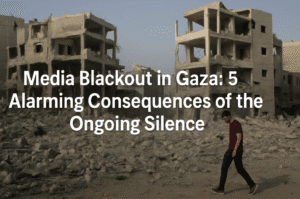Media Blackout in Gaza: 5 Alarming Consequences of the Ongoing Silence
Israel’s 19-month ban on international media in Gaza has created a dangerous vacuum for disinformation and dehumanization, UNRWA chief Philippe Lazzarini warned. With journalists barred since April 2023, credible accounts of atrocities—including over 51,000 Palestinian deaths—now rely on besieged local reporters and aid workers, 210 of whom have been killed. This censorship enables competing narratives to thrive: Israel frames its siege as self-defense, while Palestinians describe collective punishment.
Without independent verification, propaganda flourishes, eroding global empathy and accountability. Historical parallels—from Syria to Rwanda—reveal how media blackouts shield atrocities. Lazzarini urges urgent press access to counter dehumanization, stressing, “Silence breeds impunity.” As Gaza’s humanitarian collapse deepens, transparency becomes not just a journalistic right, but a lifeline for peace.

Media Blackout in Gaza: 5 Alarming Consequences of the Ongoing Silence
As the conflict in Gaza enters its 19th month, Philippe Lazzarini, Commissioner-General of the UN Relief and Works Agency for Palestine Refugees (UNRWA), has raised alarms over Israel’s prolonged ban on international media access to the enclave. Speaking at a press conference in Berlin, Lazzarini emphasized that the blockade on independent journalism is exacerbating disinformation, propaganda, and the dehumanization of Palestinians—a crisis with profound humanitarian and ethical consequences.
A Void of Accountability
Since the war’s escalation in April 2023, international journalists have been barred from entering Gaza, leaving reporting largely to local Palestinian media and aid organizations. Lazzarini condemned this restriction, stating it creates a vacuum where unverified narratives thrive. “Without independent eyes on the ground, accountability vanishes,” he warned. “Misinformation fills the gap, distorting realities and stripping victims of their humanity.”
The lack of transparency has also undermined credible accounts from humanitarian groups. UNRWA and other aid agencies have faced repeated dismissal of their eyewitness reports, which detail widespread destruction, displacement, and civilian casualties. “When relief workers’ testimonies are discredited, it erodes trust in the very institutions tasked with protecting lives,” Lazzarini noted.
Journalists in the Crosshairs
Local Palestinian authorities report that at least 210 journalists have been killed in Israeli strikes since October 2023—a staggering toll that underscores the perils of reporting in Gaza. These casualties, often working without protective gear or safe passage, have risked their lives to document atrocities, from bombed hospitals to mass graves. Their absence now leaves Gaza’s suffering increasingly invisible to the global audience.
Human Cost and Cyclical Violence
The conflict’s toll is catastrophic: over 51,000 Palestinians killed, predominantly women and children, with tens of thousands more injured or missing. Despite a brief ceasefire and prisoner exchange in January 2024, Israel resumed military operations in March, shattering hopes for sustained peace. Civilian infrastructure—schools, shelters, and UNRWA facilities—has been repeatedly targeted, displacing 85% of Gaza’s population and triggering a famine-like crisis.
Why Independent Media Matters
Historical precedents, from Syria to Rwanda, reveal how media blackouts during conflicts enable atrocities to go unchecked. In Gaza, the absence of international press has allowed competing narratives to flourish. Israeli officials often frame the war as a necessary response to security threats, while Palestinian accounts emphasize collective punishment. Without neutral observers, the world struggles to discern fact from rhetoric, weakening diplomatic and humanitarian responses.
Lazzarini stressed that dehumanization—a tactic seen in countless conflicts—fuels violence by reducing victims to abstractions. “When stories go untold, empathy fades,” he said. “The world must see Gaza’s pain to confront it.”
A Call for Transparency
UNRWA’s chief urged the international community to demand unrestricted media access and accountability for violations of international law. “The free flow of information isn’t just a principle—it’s a lifeline,” he argued. “Gaza’s civilians deserve to have their voices heard, not silenced by bombs or bureaucracy.”
As the war grinds on, the stakes extend beyond Gaza. The erosion of press freedom sets a dangerous precedent for how future conflicts are documented—and who gets to shape their legacy. For Lazzarini and UNRWA, the path to justice begins with transparency: “Only truth can pave the way to lasting peace.”
You must be logged in to post a comment.